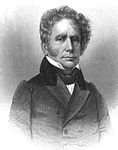Background
The first political divisions in the state fell along the lines of personal support for outstanding leaders in their struggle for power. Many of these factions were usually held together through personal friendships and family associations. The two factions at the time were the Clark faction, followers of Ex-Governor John Clark, and the Troup faction, followers of incumbent Governor George Troup. [2]
A year before the election, the Georgia General Assembly had adopted a popular election for governor. Originally, the governor had been chosen from members of the General Assembly, which had been unicameral at the time. Following the split of the General Assembly into two houses in 1789, the governor was chosen by the Senate from among three members selected by the Assembly. In 1795, the process was changed to a joint vote by the General Assembly. [1]
The Clark party, which supposedly represented the common-man, had taken credit for the change to the popular vote. On the other hand, the Troup party accepted it as a challenge to show that they were not deserving of being labeled aristocratic. [2] [4]
This page is based on this
Wikipedia article Text is available under the
CC BY-SA 4.0 license; additional terms may apply.
Images, videos and audio are available under their respective licenses.


